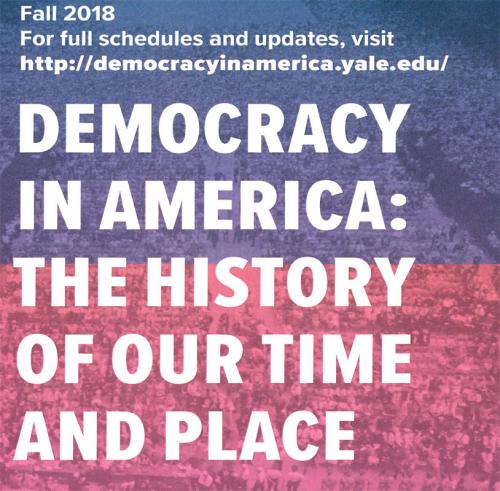
“Democracy in America: The History of Our Time and Place” provides two years of linked programming, research projects, performances, installations, seminars, panels, workshops, and interdisciplinary courses that convene the community for important intellectual and civic exchanges. This programming is an experiment in building a humanist public for sustained, intelligent, multi-vocal, and interdisciplinary discussion on topics of urgent collective concern across divides that are not easily crossed in our ordinary academic routines—high school, undergraduate, and graduate student participants; students and faculty; Yale faculty and area teachers; academic and non-academic contributors; lecture, workshop, and seminar settings; curricular and extracurricular activities; town and gown; presentations and participatory events; hands-on and classroom; analytical and artistic; archival and artistic; indoor and outdoor.
 American democracy is in peril. The nation itself is very nearly in a state of civil war, as evidenced by our polarized electoral politics; our mobilized, passionate, and counterpoised publics; and the contests now roiling among our very branches of government, the fourth estate included. Though many of us talk about this amongst ourselves every day, there have been very few forums at Yale that muster the full weight of our academic expertise on this subject or that offer venues for the urgent conversations that our civic circumstances require. The brewing crisis is not simply a partisan question, but represents a critical convergence of many long- and short-term trends: the erosion of governmental norms; the changing relationship between “public” and “private”; the costs associated with electoral politics; the evolution of the American political party as a cultural form; the imperial presidency and the theory of the unitary executive; weakening norms around the separation of powers; contests and animosities unleashed within the polity following upon the social movements of the 1960s; dramatic shifts in the nation’s economic basis over a generation; and an epistemological crisis nourished by a narrowcast media environment and the competing “realities” of internet boutiques, to name but a few.
American democracy is in peril. The nation itself is very nearly in a state of civil war, as evidenced by our polarized electoral politics; our mobilized, passionate, and counterpoised publics; and the contests now roiling among our very branches of government, the fourth estate included. Though many of us talk about this amongst ourselves every day, there have been very few forums at Yale that muster the full weight of our academic expertise on this subject or that offer venues for the urgent conversations that our civic circumstances require. The brewing crisis is not simply a partisan question, but represents a critical convergence of many long- and short-term trends: the erosion of governmental norms; the changing relationship between “public” and “private”; the costs associated with electoral politics; the evolution of the American political party as a cultural form; the imperial presidency and the theory of the unitary executive; weakening norms around the separation of powers; contests and animosities unleashed within the polity following upon the social movements of the 1960s; dramatic shifts in the nation’s economic basis over a generation; and an epistemological crisis nourished by a narrowcast media environment and the competing “realities” of internet boutiques, to name but a few.
To see upcoming events visit: Democracy in America
Events are generously funded by a 320 York Humanities Grant, Faculty of Arts & Sciences Dean’s Office, Yale.